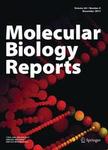版权所有:内蒙古大学图书馆 技术提供:维普资讯• 智图
内蒙古自治区呼和浩特市赛罕区大学西街235号 邮编: 010021

作者机构:Maharshi Dayanand Univ Dept Genet Rohtak 124001 Haryana India Pandit Bhagwat Dayal Sharma Univ Hlth Sci Dept Obstet & Gynaecol Rohtak 124001 Haryana India Cent Univ Panjab Dept Biochem Bathinda 151401 Panjab India
出 版 物:《MOLECULAR BIOLOGY REPORTS》 (Mol. Biol. Rep.)
年 卷 期:2025年第52卷第1期
页 面:1-19页
核心收录:
学科分类:0710[理学-生物学] 071010[理学-生物化学与分子生物学] 07[理学]
主 题:Chemical modifications RNA methylation Coding RNA Non-coding RNA Tumorigenesis Epitranscriptomic marks RNA-modifying enzymes Therapeutic strategies
摘 要:RNA modifications play essential roles in post-transcriptional gene regulation and have emerged as significant contributors to cancer biology. Major chemical modifications of RNA include N6-methyladenosine (m6A), 5-methylcytosine (m5C), N1-methyladenosine (m1A), pseudouridine (psi), and N7-methylguanosine (m7G). Their dynamic regulation highlights their roles in gene expression modulation, RNA stability, and translation. Advanced high-throughput detection methods, ranging from liquid chromatography-mass spectrometry and high-performance liquid chromatography to next-generation sequencing (NGS) and nanopore direct RNA sequencing, have enabled detailed studies of RNA modifications in cancer cells. Aberrant RNA modifications are associated with the dysregulation of tumor suppressor genes and oncogenes, influencing cancer progression, therapy resistance, and immune evasion. Emerging research suggests the therapeutic potential of targeting RNA-modifying enzymes and their inhibitors in cancer treatment. This review compiles and analyzes the latest findings on RNA modifications, presenting an in-depth discussion of the diverse chemical alterations that occur in RNA and their profound implications in cancer biology. It integrates fundamental principles with cutting-edge research, offering a holistic perspective on how RNA modifications influence gene expression, tumor progression, and therapeutic resistance. It emphasizes the need for further studies to elucidate the complex roles of RNA modifications in cancer, as well as the potential for multimodality therapeutic strategies that exploit the dynamic and reversible nature of these epitranscriptomic marks. It also attempts to highlight the challenges, gaps, and limitations of RNA modifications in cancer that should be tackled before their functional implications. Understanding the interplay between RNA modifications, cancer pathways, and their inhibitors will be crucial for developing promising RNA-based therapeutic approac